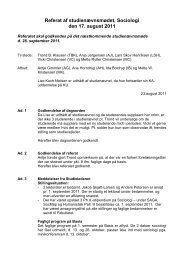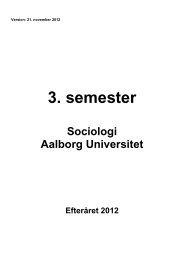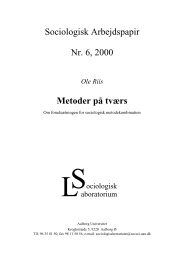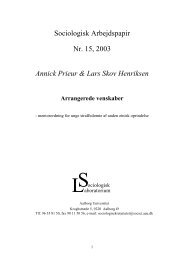Utopianism in the Work of Zygmunt Bauman - Sociologi - Aalborg ...
Utopianism in the Work of Zygmunt Bauman - Sociologi - Aalborg ...
Utopianism in the Work of Zygmunt Bauman - Sociologi - Aalborg ...
Create successful ePaper yourself
Turn your PDF publications into a flip-book with our unique Google optimized e-Paper software.
A voice <strong>of</strong> utopian hope resonates <strong>in</strong> <strong>Bauman</strong>’s work, a hope for <strong>the</strong> future <strong>of</strong><br />
humanity, a hope that will keep burn<strong>in</strong>g until <strong>the</strong> vision <strong>of</strong> sociology carried<br />
like a torch by him for decades is f<strong>in</strong>ally ei<strong>the</strong>r ext<strong>in</strong>guished or passed on.<br />
Notes<br />
1 <strong>Bauman</strong> himself is suspicious <strong>of</strong> <strong>the</strong> myopic understand<strong>in</strong>g that has determ<strong>in</strong>ed <strong>the</strong> fate <strong>of</strong><br />
<strong>the</strong> concept <strong>of</strong> ‘utopia’: “I suspect that <strong>in</strong> our social-scientific usage all too <strong>of</strong>ten we unduly<br />
narrow down <strong>the</strong> concept <strong>of</strong> ‘utopia’ to <strong>the</strong> early modern bluepr<strong>in</strong>ts <strong>of</strong> <strong>the</strong> good society, understood<br />
as a k<strong>in</strong>d <strong>of</strong> totality which pre-empts its members’ choices and determ<strong>in</strong>es <strong>in</strong> advance<br />
<strong>the</strong>ir goodness, however, understood […] I am now <strong>in</strong>cl<strong>in</strong>ed to accept that utopia is an<br />
undetachable part <strong>of</strong> <strong>the</strong> human condition […] I now believe that utopia is one <strong>of</strong> humanity’s<br />
constituents, a ‘constant’ <strong>in</strong> <strong>the</strong> human way <strong>of</strong> be<strong>in</strong>g-<strong>in</strong>-<strong>the</strong>-world. This does not mean that all<br />
utopias are equally good. Utopias may lead to a better life as much as <strong>the</strong>y may mislead and<br />
turn away from what a better life would require to be done” (<strong>Bauman</strong> & Tester 2001:48-50).<br />
Throughout <strong>the</strong> years he has moved from <strong>the</strong> somewhat narrow understand<strong>in</strong>g to a much<br />
more encompass<strong>in</strong>g notion <strong>of</strong> utopia as part and parcel <strong>of</strong> <strong>the</strong> human predicament and condition.<br />
2 Central to Mannheim’s position is <strong>the</strong> separation <strong>of</strong> ‘utopia’ from ‘ideology’. Utopia transcends<br />
reality and breaks <strong>the</strong> bonds <strong>of</strong> <strong>the</strong> exist<strong>in</strong>g order through, at some po<strong>in</strong>t <strong>in</strong> time, be<strong>in</strong>g<br />
passed over <strong>in</strong>to actual conduct whereas ideologies are <strong>the</strong> situationally transcendent ideas<br />
that never succeed <strong>in</strong> a de facto realisation <strong>of</strong> <strong>the</strong> <strong>in</strong>tended and projected contents. Transcendence,<br />
however, constitutes <strong>the</strong> core <strong>of</strong> both types <strong>of</strong> th<strong>in</strong>k<strong>in</strong>g whe<strong>the</strong>r <strong>the</strong>y reach <strong>the</strong>ir po<strong>in</strong>t<br />
<strong>of</strong> orientation or not (cf. Mannheim 1936/1976:173ff, 184). This analytical dist<strong>in</strong>ction is, admittedly,<br />
at odds with <strong>the</strong> one advanced <strong>in</strong> this article where utopian ideas do not necessarily<br />
have to be transformed <strong>in</strong>to concrete action <strong>in</strong> order to be deemed utopian. Leonidas Donskis<br />
<strong>the</strong>refore also noted that “without ideology, utopianism becomes little more than <strong>the</strong> free play<br />
<strong>of</strong> imag<strong>in</strong>ation devoid <strong>of</strong> cultural – aes<strong>the</strong>tic, moral, and <strong>in</strong>tellectual – articulation” (Donskis<br />
2000:2). Utopia and ideology are, <strong>in</strong> o<strong>the</strong>r words, <strong>in</strong>extricable l<strong>in</strong>ked and <strong>in</strong> <strong>the</strong> work <strong>of</strong><br />
<strong>Bauman</strong> is more than merely a ‘free play <strong>of</strong> imag<strong>in</strong>ation’ – it is <strong>in</strong>stead dead serious. For a<br />
good and compressed discussion <strong>of</strong> ideology and utopia from <strong>the</strong> early liberalism and marxism<br />
onwards, see Chattopadhyaya (1997:67ff).<br />
3 As Jeffrey Alexander captures this po<strong>in</strong>t very well: “Utopian conceptions <strong>in</strong>form and complement<br />
<strong>the</strong> k<strong>in</strong>ds <strong>of</strong> differentiated and pluralistic social orders we <strong>in</strong>habit today. For utopias<br />
to be ‘real’, it is enough that various conceptions <strong>of</strong> utopia do, <strong>in</strong> fact, animate <strong>the</strong> nooks and<br />
crannies, <strong>the</strong> spheres and subsystems, <strong>of</strong> such a social order. The reality <strong>of</strong> utopia does not<br />
(empirically), cannot (<strong>the</strong>oretically), and <strong>in</strong>deed should not (normatively) depend on its actual,<br />
that is complete, realization” (Alexander 2001:581). Thus, for utopia to be real merely<br />
means that it should to some extent be thought <strong>of</strong> and be present <strong>in</strong> <strong>the</strong> back <strong>of</strong> <strong>the</strong> m<strong>in</strong>ds <strong>of</strong><br />
people – it does not have to be realised as a specific social order.<br />
4 Despite be<strong>in</strong>g relatively sceptical regard<strong>in</strong>g utopias and <strong>the</strong>ir tendency to be parad<strong>in</strong>g as<br />
potential totalitarian ideologies <strong>in</strong> disguise, Kolakowski is also capable <strong>of</strong> see<strong>in</strong>g <strong>the</strong> possibilities<br />
<strong>in</strong>herent <strong>in</strong> utopias for human purposes when he <strong>in</strong> <strong>the</strong> same connection cryptically<br />
remarked: “The existence <strong>of</strong> a utopia as a utopia is <strong>the</strong> necessary prerequisite for its eventu-<br />
45










